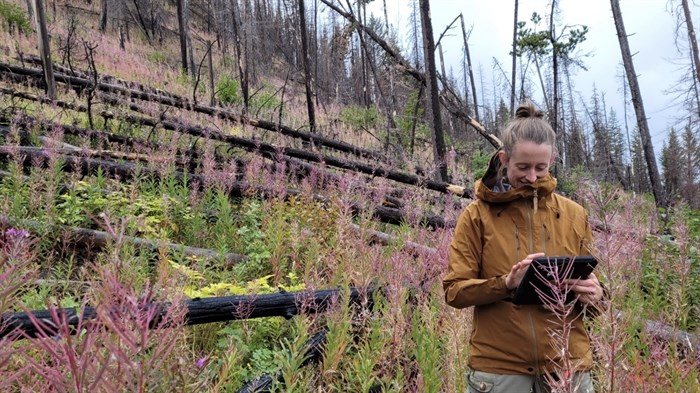
UBC researcher Sarah Dickson-Hoyle working in the field with Skeetchestn First Nation.
Image Credit: Skeetchestn Natural Resources Corporation
September 17, 2023 - 4:30 PM
Skeetchestn First Nation is asking the public to leave the deer and their homes alone, particularly after wildfires.
Skeetchestn Natural Resources Corporation is working on an environmental impact project about the effects of wildfire on deer in their territory.
The project aims to monitor deer populations following the wildfires from the past few years, and inform the public about how to help with natural habitat recovery.
Shaun Freeman, Senior Wildlife and Habitat Biologist at Skeetchestn Natural Resources Corporation, is leading the project with support from UBC researchers.
“Everyone has the same goal – sustainability of the environment and having healthy wildlife and ecosystems,” Freeman said. “To achieve this, we’re asking people to stay out of the burns, particularly the low elevation areas, this winter.”
In studies following the 2021 wildfire season which burned 50 per cent of deer habitat in the territory, Skeetchestn researchers found a significant reduction in the deer population.
Researchers found human interaction with the wildlife, coupled with loss of habitat, increased the deer's stress levels making it harder for the deer population to procreate and recover.
“Just because the ashes are cool and fireweed, herbs and grass are growing, it doesn’t mean it’s safe to go out and play without impacting wildlife or the ecology,” Freeman said.
Freeman and his team of researchers are monitoring deer with cameras set up around the forest as well as studying the plants which are regrowing in the deer’s habitat.
Sarah Dickson-Hoyle, a UBC researcher on the project, says it is important to let First Nations communities lead the way when studying wildfire recovery in their territories.
“(We should be) invited in through the relationships that I already have to support work that they're leading. So I think that's really important as we're thinking about partnerships and collaboration and how we work with First Nation communities and support their work,” Dickson-Hoyle said.
READ MORE: Meet the Indigenous UBC scientist charting the future of fisheries — one salmon at a time
Dickson-Hoyle hopes this project will help people understand the impacts on the environment continue long after the fires go out.
“A key piece of driving the public education campaign that Skeetchestn are leading is there's not a lot of awareness that it's not just the fire that impacts the landscape, but also the decisions that are made after a fire,” she said.
Skeetchestn scientists want the public to know driving ATVs, camping, fishing, and other outdoor activities have a significant impact on how well an ecosystem recovers after a wildfire.
“If you do visit the Territory and come into a burned area, be cognizant, try to be respectful and keep your disturbance to a minimum in order to give nature and ecology time to heal,” Freeman said.
To contact a reporter for this story, email Jesse Tomas or call 250-488-3065 or email the editor. You can also submit photos, videos or news tips to the newsroom and be entered to win a monthly prize draw.
We welcome your comments and opinions on our stories but play nice. We won't censor or delete comments unless they contain off-topic statements or links, unnecessary vulgarity, false facts, spam or obviously fake profiles. If you have any concerns about what you see in comments, email the editor in the link above. SUBSCRIBE to our awesome newsletter here.
News from © iNFOnews, 2023